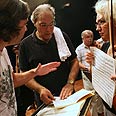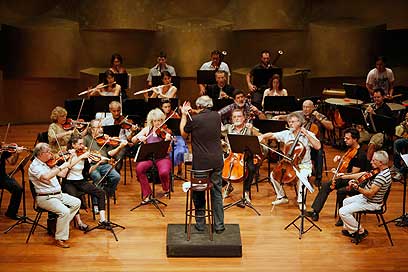
'Wagner is just music, not politics'
As a child in Vienna, Roberto Paternostro saw his grandfather attack an SS officer who sent his family to concentration camps. This didn't stop Israel Chamber Orchestra conductor from initiating controversial concert at festival honoring German anti-Semitic composer
At the same time, Paternostro – who is half Jewish – was shaken by the unprecedented achievement of Austria's far-right Freedom Party in the Vienna city elections, reviving the problematic history of his homeland.
Following these incidents, the 53-year-old Austrian composer had many conversations with his mother recently, seeking her approval to disclose the story of her Judaism and his family's Holocaust.
This isn't an easy move. Anti-Semitic Austria still has many Jews – most of them Holocaust survivors – who are busy hiding their real identity from their surroundings. The rise of the far right in Vienna helped strengthen Paternostro's rare decision.
Paternostro is the name of the conductor's father, a strictly Italian Catholic name. But his mother is Jewish. She and her close family members survived the Holocaust, in concentration camps or hideouts. Other relatives died in Auschwitz.
"My mother carried the yellow patch for six years," Paternostro tells Yedioth Ahronoth. "I had very intensive conversations with her in recent days, and I told her, 'I'm going to say that I come from a Jewish family. But we live in Austria, and perhaps you wouldn't like me to do that, because it would implications on you and the entire family, including your children and mine.'
"She told me there was no problem as far as she was concerned and that I was free to do what I want. And then she told me about the horrible things she experienced during the war, about relatives who were murdered in Auschwitz."
And with all this family past, you have no problem playing Wagner?
"No. His music is genius. It's a connection between romantic and modern music, between Robert Schumann, Gustav Mahler, and Arnold Schoenberg. The two of them, by the way, were Jewish and big Wagner fans. Gustav Mahler was the best Wagner conductor in the Vienna State Opera."
What do you tell those who claim Wagner's music is anti-Semitic?
"There is an ongoing discussion on the matter, but it cannot be proved unequivocally. There's no doubt that a significant part of Wagner's outlook was anti-Semitic. He said terrible things about Jews.
"On the other hand, the person who conducted the debut of 'Parsifal' in Bayreuth was Hermann Levi, a rabbi's son. Wagner was still alive at the time. Today people say 'Parsifal' is an anti-Semitic piece. Could it be that Levi was so stupid and didn't get it at the time? I have read many books discussing the so-called anti-Semitic inclinations in Wagner's work. I don't see it that way and neither do many others."
In the name of artistic freedom
Bayreuth Municipality officials and Wagner's great granddaughter, Katharina – one of the directors of the well-known Bayreuth Festival – were slated to take part in a historic press conference in Tel Aviv recently. Together with Paternostro, they planned to announce the Israel Chamber Orchestra's upcoming concert at the festival.
After Yedioth Ahronoth reported of the planned performance and Wagner's first visit to Israel, the parties decided to move the media event from Israel to Berlin. Eventually, they decided to cancel the entire press conference so as not to pour more fuel on the heated debate in Israel, and issued a joint press release instead.
"I thought," Paternostro admits, "that since we are living in 2010, perhaps we could reopen this issue. After all, we are not going to play an entire Wagner opera in Bayreuth, and not 'Parsifal' or 'Twilight of the Gods,' but only 10 minutes of intimate music from the 'Siegfried' opera. And we are not going to do it in Israel. I thought we could use it to convey a symbol of tolerance. And perhaps the new generation, which I belong to, would be able to look at this music differently."

Israel Chamber Orchestra. 'No one objected' (Photo: Reuters)
Paternostro says he has no plans to cancel the Bayreuth concert. The matter is close to his heart. The Israel Chamber Orchestra has no plans to renege on the controversial journey either, he says.
"We spoke to the orchestra musicians," Paternostro clarifies. "We held a management assembly and asked the players if they were interested in travelling to Bayreuth and performing there. We told them clearly that if anyone was not interested or had any doubts, they could voice their opinion. No one objected; they all wanted to go."
And yet, we are talking about an Israeli orchestra performing in Bayreuth. Israel still has Holocaust survivors who find this idea unacceptable. Didn't you take their furious response into account?
"I definitely did. I must say something which I view as extremely important: I have a lot of respect for anyone who experienced those terrible times. When I was a child I spoke to my grandfather one day. We were sitting by the table. I asked him about the time he was transported from Vienna to the Theresienstadt concentration camp. He couldn't answer me. He just wept.
"I experienced the horrors of the Holocaust in my family, so I have the utmost respect for Holocaust survivors. And yet, there is something called artistic freedom. No one forces those who went through the Holocaust to come to our concert, to listen to Wagner's music or to take part in our performance."
And how do you feel about the angry reactions?
"I think it's worth fighting for the idea of reconciliation and tolerance. For me it's just about music, not politics. I'm not a politician. I don't belong to any party or body. My organization is called music. I've played Wagner all my life, and I'm not the first Jewish conductor to do so. I was preceded by Bruno Walter, Otto Klemperer, and many others.
"I know so many people in Israel who travel to the Bayreuth Festival every year, or buy tickets to Wagner operas every time they visit Vienna, Berlin, Paris or New York. I have friends in Israel, music lovers, who have cabinets filled with Wagner recordings at home. And let me tell you something very provocative: What about Lufthansa, Volkswagen, Audi and Siemens? Is buying their products okay?! Come on."
Do you expect any acts of protest, perhaps during the concert itself?
"I have no idea."
The idea to bring the Israel Chamber Orchestra to Bayreuth was raised about a year ago. It happened during a meeting between Paternostro and Katharina Wagner, who was recently put in charge of the festival despite her young age.
"It was my idea," he confirms. "I suggested it to her and she was very interested. She thought such a concert would help relieve the tension between the sides. She's 31 years old and wants to wipe the slate clean in terms of her family's history and link to the Nazis. This is why she decided to open the family archives to historians. I think it's very important to her, and that's why she has also decided to sponsor our performance."
"I insisted on playing pieces by Mendelssohn, Mahler and a contemporary Israeli composer, Tzvi Avni, in our concert in Bayreuth," Paternostro stresses. "I'm bringing these three and playing part of a Wagner piece. I'm not conducting a Wagner concert. And I'll start with Tzvi Avni's 'Prayer'. It was important to me to start off with an Israeli composer who has German roots."
Mezuzah at entrance to Vienna flat
Throughout the interview Paternostro insists on highlighting his Jewish roots.
"I knew I was a Jew from the day I could think," he says. "I grew up at my maternal grandparents' home in Vienna. The place I am talking to you from, my home in Vienna's 13th district, is where my mother's grandfather used to sit. I remember my grandfather putting on phylacteries and wearing a praying shawl. We strictly observed Shabbat and Yom Kippur in our house. My grandmother lit candles every Friday evening. A mezuzah hangs at the entrance to my apartment in Vienna. It's rare here, but that's how we keep the tradition alive.
"When my mother was a child," he continues, "she was hidden in a wooden house in people's backyard until the end of the war. She couldn't get out of there. She was supposed to leave Austria with one of the 'children transports' organized before World War II broke out, but the plan was never executed.
"My mother's parents were thrown out of their home, transferred to a 'house of Jews' in which 30 people were stuffed in one apartment. From there they were expelled to the Theresienstadt concentration camp. My mother still has the postcards they sent her from there, with the horrible words, 'We still feel good.' But they survived the Holocaust. My uncle Walter, who produced all of the albums of Maria Callas and Otto Klemperer, lost his parents in Auschwitz."
Paternostro continues the horrifying account: "I remember in the 1960s travelling on a streetcar in Vienna with my grandfather. Suddenly he began shouting, approached one of the people, grabbed him by the throat and threw him off the cart. We didn't understand what happened. Later I discovered that he had identified the SS officer who sent him and his family to the concentration camp. What can I say?! It's a story nearly every Jewish family in Israel is familiar with.
"My mother's brother, who was born in the midst of the war under terrible conditions and went through the war in hiding, got on a plane and volunteered to help the IDF immediately after the Six-Day War broke out."
Is being Jewish what made you connect to the Israel Chamber Orchestra?
"Absolutely. I love this country. As a young man, I used to visit Israel often. Later on, I arrived with my family and conducted in Jerusalem, Rishon Lezion, Haifa and Tel Aviv's opera. I feel very connected to Israel. Every time I land at Ben-Gurion Airport I feel at home.
"There was a time when I considered making aliyah, but I eventually decided against in. And yet, it will never be too late. A flag of Israel hangs at my house's entrance hall. I love everything about Israel – the noise, the chaos, and the intelligence. I have many friends there. They are very civilized people. And I love our audience."
And yet, you live in Vienna, where the far right is growing stronger.
"It's terrible. It's Austria, and it also made me ask my mother if she would let me declare publicly that I'm a Jew. It's a shameful disaster. After all, most of the worst Nazi criminals came from Austria. Why? I have no answer."
- Follow Ynetnews on Facebook










